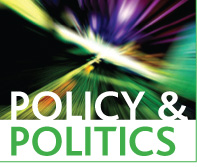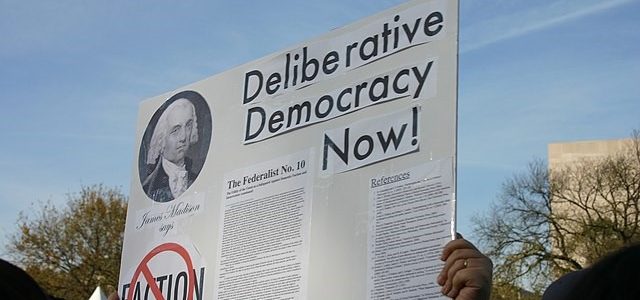Vesa Koskimaa and Lauri Rapeli
 This section of Discover Society is provided in collaboration with the journal, Policy and Politics. It is curated by Sarah Brown.
This section of Discover Society is provided in collaboration with the journal, Policy and Politics. It is curated by Sarah Brown.
A significant body of research has shown that people are growing increasingly disappointed with how representative democracy functions. A big part of the problem seems to be a detachment of policymakers from citizens’ everyday problems, which prompts citizens to react by turning their backs on conventional politics. Political parties were born into a very different much simpler world of class politics. Politicians are now faced with extremely complex and technical problems that extend well beyond national boundaries and administrative branches – and quite likely, the average citizen’s informational faculties too. While the change of politicians’ foci from class interests to climate interests seems perfectly understandable from the general viewpoint, so does the resentment of citizens who have been led to believe that they live in a democracy, which means that the will of the majority will prevail.
To bridge the gap between citizens and elite politics, it is now widely believed that citizens ought to be more engaged in political decision-making. Thus, many scholars and other observers have turned to democratic innovations for solutions on how the link between democratic publics and their democratic leaders could be improved. Any institution or procedure that extends beyond traditional forms of party-based representation, like referendums, could be conceived as an innovation. However, during the past two decades, innovations based on the theory of deliberative democracy have probably received most attention by scholars and practitioners. Broadly speaking, deliberative democracy refers to a decision-making process, which emphasises informed, reflexive and egalitarian interpersonal communication. While deliberative democrats’ visions about possible and desirable effects of deliberation surely vary, in general the theory expects informed communication to foster a broader understanding between participants.
To put theory into practice, mini-publics, like citizen initiative reviews, juries and assemblies have already been widely used in democracies across the world. In these deliberative groups, randomly selected individuals discuss and decide upon a specific political issue on the basis of best expert knowledge and argumentation. A considerable number of studies have discussed theoretically whether deliberative bodies could fix the problems of contemporary representative democracy. Other studies have used experimental methods to examine the internal proceedings and effects of these deliberations. What has, however, almost totally been ignored by scholars are the views of policy-makers themselves.
This omission is interesting for many reasons, not least because policymakers’ opinions on democracy eventually determine the shape of new democratic institutions. If policymakers doubt citizens’ capacity to govern themselves, it seems unlikely that they would extend significant powers to such institutions. As policymakers certainly know more about the hard realities of decision-making, they are likely to be sceptical, as the few existing studies have suggested. Citizens, on the other hand, have been shown to be very willing to do much more.
In our recent research article, we argue that, if deliberative mechanisms are expected to bridge the gap between citizens and policymakers, scholars need to assess and compare the attitudes and behaviours of both groups. A crucial question, which has thus far lacked a proper answer, is how much demand there is for more direct involvement among citizens? In addition, and arguably even more importantly, are policymakers prepared to share some of their political power to provide opportunities to meet this demand?
In our article, we examine this problem using identical sets of questions to compare Finnish policymakers and voters’ perceptions of citizens’ capacity to directly engage in democratic national-level governance through a deliberative mini-public. Combining two unique datasets, we analyse the perceptions of representative samples of Finnish voting-age citizens and national-level policy-makers. More specifically, we compare their answers to survey statements which asked respondents to assess how much they would trust the decisions of a deliberative citizen assembly. The statements varied in terms of how much power the assembly should be given, and how much the powers of decision-makers should, in turn, be restricted. The most lenient option allowed the deliberative assembly only to produce a non-binding public statement, while the extreme option was a decision reached through citizen deliberation that would be binding for decision-makers (i.e. the deliberative assembly effectively makes the decision).
We considered Finland a suitable context for a case study on this issue since Finland is recognized for having a population with “high civic literacy”, so consequently, it should have more deliberative capacity than populations of most other countries. Compared to other Nordic countries, Finland has also suffered from a relatively deep democratic malaise, which should incentivise policymakers to include ordinary citizens more in the democratic process. In other words, in Finland, the views of citizens and policymakers should harmonise well.
What we found, however, was a wide gap: although citizens showed high levels of trust in their own capacity to make decisions within such deliberative groups, policymakers remained very sceptical of their value. Policymakers only trust the citizenry to contribute very general and unbinding policy advice, whereas many citizens would like to exert direct control over policies. In every statement (i.e. individual task of the hypothetical assembly) over half of voter respondents trusted the assembly fully, a lot or at least to some extent (other options were: a little or not at all). Even the most demanding tasks – to advise decision-makers on issues, to oblige decision-makers to vote a certain way – gathered majority support (64.3% and 52.7%, respectively), as around 20% answered ‘cannot say’ for every item.
Among policymakers, only the weakest functions of the hypothetical assembly received over 50% trust (fully, a lot or to some extent) – these functions would enable the assembly only to make statements to the public, and advise decision-makers on priorities –. The more demanding tasks gained significantly less trust from policymakers. Only 37.6% trusted the assembly fully, a lot or to some extent when advising decision-makers on issues (compared to citizens’ 64.3%), and only mere 9.8% trusted the assembly in obliging decision-makers to vote a certain way (citizens: 52.7%). The gap was significant. Voters clearly trust their capacity to self-govern, but policymakers most certainly do not.
Even in Finland, a country with a “high civic literacy” population that could be considered as “a most likely case” for developing democratic innovations, policymakers do not view deliberative mini-publics as a particularly attractive way to encourage a greater degree of political engagement among voters. For champions of citizen deliberation, the results look grim – and considering the similarity of basic political configurations around Europe, probably rather general, too. The major “trust gap” we identified can be interpreted to signify a significant (and likely growing) distance between policy-making elites who try to manage increasing political complexity, and the influence-seeking masses that feel estranged from institutionalised, democratic politics.
Although we did not examine the causes for the gap empirically, reasons that are understandable exist on both sides. Citizens’ high trust for their governing capacity can emanate from feelings of being outside and the adjoining lust for power, or mere distrust for established elites. Also, it may signal overconfidence that is based on citizens’ long distance to real decision-making processes. Policymakers might be motivated by rather similar reasons, i.e. the will to hold on to power and distrust towards voters who are clueless about real decision-making processes. Whatever the real reasons might be, a situation where even a democratically elected elite monopolises policymaking power from the masses who think they could do a better job is dangerous. It is a very fertile ground for populism that aims to undermine an established order.
However, we also detected a narrow yet bright silver lining: policymakers are not equally pessimistic about every type of citizen involvement. They are clearly more positive about citizen involvement that takes a more general and indirect form (i.e. advising on general issues rather than obliging on specific ones). Instead of replacing representative institutions with direct citizen rule, a halfway solution might be possible. In any case, democratic innovations cannot be established without the involvement of policymakers.
Overall, our study is intended as a reminder for the growing number of scholars working with deliberative mini-publics and other similar instruments that elite attitudes, which thus far seem primarily negative, should be given much greater consideration.
Vesa Koskimaa is Research Associate at the Social Science Research Institute, Åbo Akademi University. Lauri Rapeli is Head of Research at the Social Science Research Institute, Åbo Akademi University.
